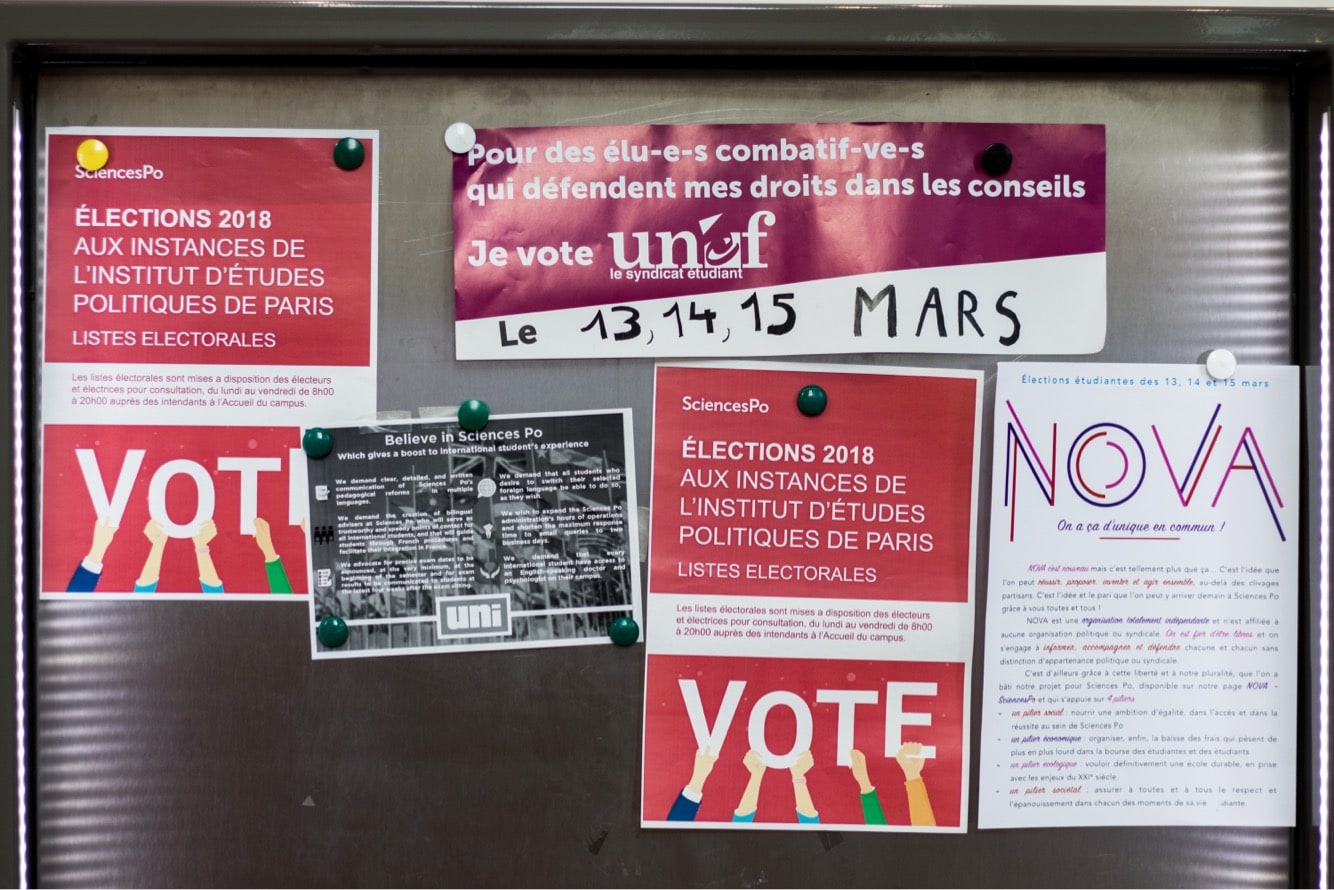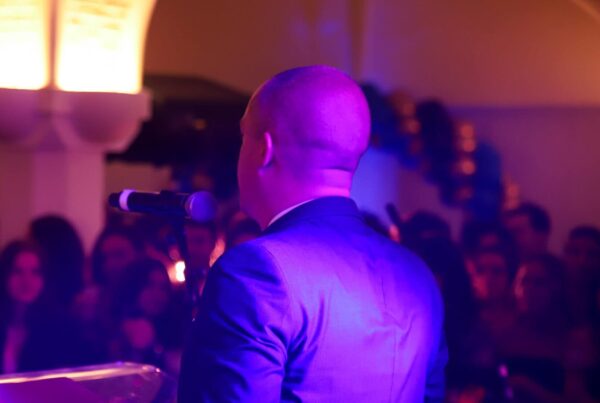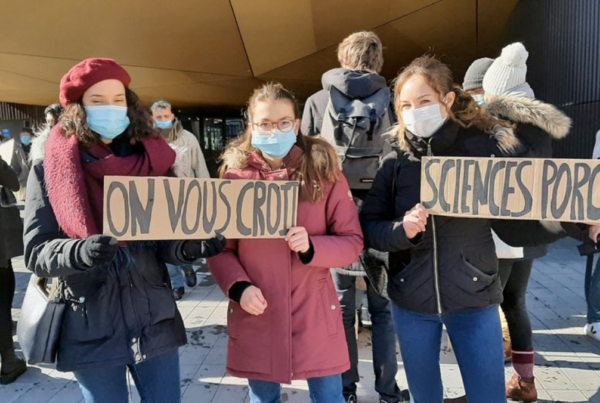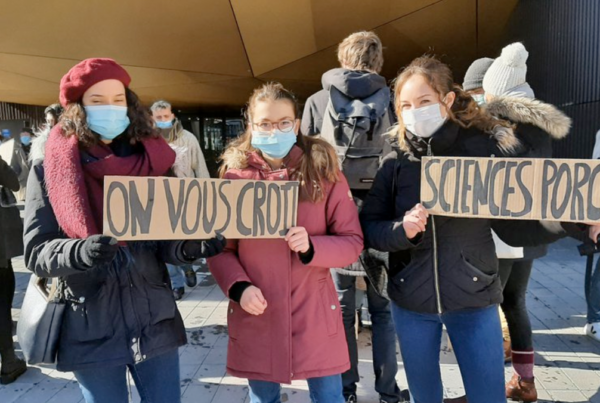By Jacob Hartley
To much surprise, UNEF (L’Union nationale des étudiants de France) was the largest recipient of votes from the recent student union elections. UNEF, one of the two major student unions, garnered over 40% of the first round vote in the races for the Institute’s Board of Directors, the Academic Board and the Student Life and Education Committee. According to the official results, nearly 40% of students and 35% of doctoral candidates participated in the election.
The Institute’s Board of Director elections saw a shakeup in the top two vote-getters, as UNI (Union nationale interuniversitaire) fell into the third place spot with 18% of the vote behind NOVA, with 22.5% of the vote, a student union that is known for its broad goals and to some a “compromise choice” between the embattled UNEF and UNI unions. UNEF received double the votes of NOVA, gathering nearly 45% of the total vote. Solidaires Etudiant-e-s followed not far behind from UNI, finishing in fourth and last place with 14.5% of the vote.
Near mirrored results were seen with the Student Life and Education Committee, but UNI suffered even stronger setbacks in this race, nearly tying for last place with Solidaires (there was a five vote difference between third and fourth). However, UNEF’s vote count (in percentages) slightly decreased in comparison to the other race while NOVA made small gains. But, a modest amount of more students (nearly 150) voted in this part of the election.
Anton Mukhamedov, elected as a “suppleant” to the Institute’s Board of Directors representing UNEF, stated that his union is “ happy that we managed to conserve our majority in both councils”, noting that this “victory” signifies “that students still rely on UNEF as a union that is committed to defending their rights.”
The Sundial reached out to members of the UNI List, but these members had no comments to offer for this publication.
The rights Mukhamedov spoke of were themes that Euram 1A Sam Turnbaugh saw as important as well, and a nod to the ant-gay marriage stance once held by UNI. Turnbaugh thought that the students “would be strongly opposed to their social views (particularly on LGBT rights)” and even further opposed to UNI. Turnbaugh felt that international students like him were even largely ignored during the election, commenting that the election “wasn’t very accessible to international students. In fact…” Turnbaugh sound it interesting that “UNI were the only ones to really campaign in English, targeting a group that was largely ignorant of what they stood for” in a nod to how UNI may have used international students with a lesser idea of the controversy within France to their advantage.
Euram 2A Jake Jackowski agreed, and made his decision based on the fact he “ would not consider voting for a student union branch whose national organization has the anti-gay marriage baggage” even if UNI’s Sciences Po chapter and a multitude of its candidates have denounced this position. In fact, Jackowski didn’t have any issue with “any of the individual UNI list members from Sciences Po” but that he has “stronger personal ties” to those UNEF members running, leading him to believe that “those ties led me to trust the UNEF list members’ commitment to the school community.”
But Mukhamedov isn’t closing the door on working with UNI, NOVA, or Solidaires for that matter. He said that it all boils down to “the importance to come together whenever our goals converge” on topics such as “ the rise of tuition fees” or “the preservation of campus-specific programs.”
Turnbaugh and Jackowski represent small minorities of their respective cohorts. For this writing, the author reached out to nearly 30 students, most of whom had no idea the election happened, or were too angry at the unions to vote. According to one unnamed Euram 1A, she felt that she “didn’t know enough” to vote. Another second year student commented that he “didn’t know the election even happened” which then proceeded with the question “who even won?”
Mukhamedov admits that even as UNEF has “done well in the past few years” he still believes that “there is still ground to cover.” Whether that ground is reaching out to former opponents, international students, or informing students better about their function in their students lives remains to be seen.
Editor’s note: Anton Mukhamedov is the editor in chief of The Sundial Press responsible for multimedia. He was not involved in the editing and publication of this article.
Other posts that may interest you:
- The Trouble with ‘Ecocide’
- Carbon dioxide removal – hit or miss?
- Local Victories for Turkish Opposition — A Sign of Hope?
- Are France and Japan a Mismatch Made in Heaven?
- A Reflection on Dark Tourism
Discover more from The Sundial Press
Subscribe to get the latest posts sent to your email.





